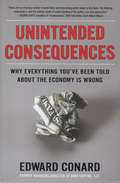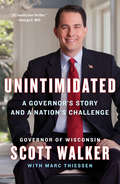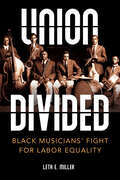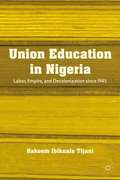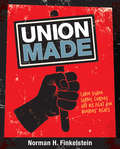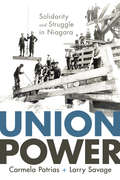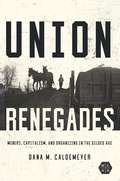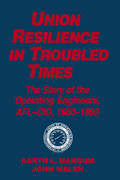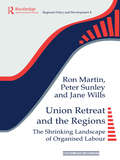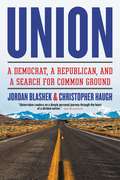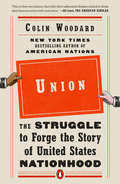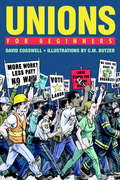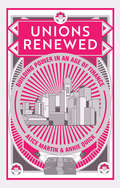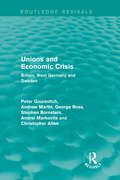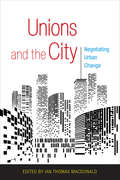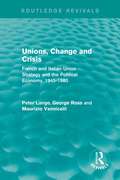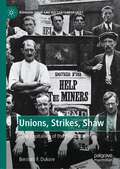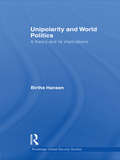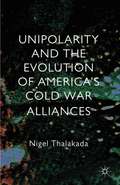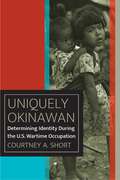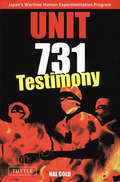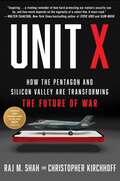- Table View
- List View
Unintended Consequences: Why Everything You've Been Told about the Economy Is Wrong
by Edward ConardIn the aftermath of the Financial Crisis, many commonly held beliefs have emerged to explain its cause. Conventional wisdom blames Wall Street and the mortgage industry for using low down payments, teaser rates, and other predatory tactics to seduce unsuspecting home owners into assuming mortgages they couldn't afford. It blames average Americans for borrowing recklessly and spending too much. And it blames the tax policies and deregulatory environment of the Reagan and Bush administrations for encouraging reckless risk taking by wealthy individuals and financial institutions. But according to Unintended Consequences, the conventional wisdom masks the real causes of our economic disruption and puts us at risk of facing a slew of unintended--and potentially dangerous--consequences. This book addresses many essential but overlooked questions, such as: If the United States had become a nation of reckless consumers rather than investors, why did productivity soar in the years leading up to the meltdown? If predatory bankers took advantage of home owners, why did down payments decline, thereby shifting risk from home owners to lenders? If the risks were easy to spot, why did top political and financial advisers encourage lenders to make unsound investments? If new regulations encourage banks to hold enough capital to fund withdrawals and not just loan losses, how will the economy underwrite the risks necessary to reach full employment? In an attempt to set the record straight and fill the void left by other analysts, Conard presents a fascinating and contrarian case for how the economy really works, what went wrong over the past decade, and what steps we can take to start growing again.
Unintimidated
by Scott Walker Marc Thiessen"Today, we can sound like conservatives and act like conservatives--and still win elections. Those who say we can't don't see what I see in Wisconsin and what my fellow governors in states all across America see. We don't need to change our principles. What we need is more courage." In 2011, Wisconsin governor Scott Walker's chances of staying in office looked bleak. Angry protesters--furious about his collective bargaining proposal--swarmed Madison, camped in the capitol, and attempted to block the passage of the governor's reform legislation. Teachers unions accused him of sabotaging education. His approval numbers fell to the basement, and with the national media's descent on Wisconsin, liberals denounced "Dead Man Walker." He found himself fighting for his reforms, fielding death threats, and facing an unprecedented recall election. But then something happened. Walker's policies began to work. His constituents realized they were better off with his leadership, and in June 2012, he became the first governor in American history to survive a recall attempt, winning with a higher share of the vote than he had for his original election. In Unintimidated, Governor Walker tells the story of his fight to save Wisconsin from a $3.6 billion budget deficit while simultaneously improving the state's schools and public infrastructure. He describes how he stood for his convictions against enormous political pressure and personal attacks. He explains how he knew his reforms would work, based on his experience as a local official. Speaking from the perspective earned from his resounding victory, he outlines lessons conservatives on the national stage can learn from his success, such as: * Change the polls, not your principles. * Don't accept the false choices presented to you. * You can reform entitlements and survive. * Austerity is not the answer. * Never stop reforming. Walker is living proof that conservatives need not move to the center to win. He argues that Republicans must offer Americans big, bold, positive solutions for our nation's challenges--and have the courage to implement them. Walker has shown that even President Obama will back down when faced with reforms promoted with common sense and courage.
Unintimidated
by Scott WalkerA controversial governor recounts his fight to reform his state and issues a call to action for the whole country In 2010, Scott Walker was elected governor of Wisconsin with a mandate to improve its economy and restore fiscal responsibility. With the state facing a $3. 6 billion budget deficit, he proposed a series of reforms to limit the collective bargaining power of public employee unions, which was costing taxpayers billions in pension and health care costs. The reaction was swift and severe. Angry protesters gathered outside the capitol, teacher unions accused him of sabotaging education, and the media descended on Wisconsin to make it a national controversy. Soon, liberals nationwide were denouncing Governor Walker. He stood his ground despite relentless political and personal attacks with the help of supporters across the country who hailed him for having the courage to drive real change. In June 2012, he won a special recall election with a higher share of the vote than he had for his original election, becoming the first governor in the country to survive a recall election. In this book, Governor Walker shows how his commitment to limited but effective government paid off. During his tenure Wisconsin has saved more than $1 billion, property taxes have gone down for the first time in twelve years, and the deficit was turned into a surplus. He also shows what his experiences can teach defenders of liberty across the country about standing up to the special interests that favor the status quo. .
Unintimidated: A Governor's Story and a Nation's Challenge
by Scott Walker Marc Thiessen"Today, we can sound like conservatives and act like conservatives--and still win elections. Those who say we can't don't see what I see in Wisconsin and what my fellow governors in states all across America see. We don't need to change our principles. What we need is more courage." In 2011, Wisconsin governor Scott Walker's chances of staying in office looked bleak. Angry protesters--furious about his collective bargaining proposal--swarmed Madison, camped in the capitol, and attempted to block the passage of the governor's reform legislation. Teachers unions accused him of sabotaging education. His approval numbers fell to the basement, and with the national media's descent on Wisconsin, liberals denounced "Dead Man Walker." He found himself fighting for his reforms, fielding death threats, and facing an unprecedented recall election.But then something happened. Walker's policies began to work. His constituents realized they were better off with his leadership, and in June 2012, he became the first governor in American history to survive a recall attempt, winning with a higher share of the vote than he had for his original election.In Unintimidated, Governor Walker tells the story of his fight to save Wisconsin from a $3.6 billion budget deficit while simultaneously improving the state's schools and public infrastructure. He describes how he stood for his convictions against enormous political pressure and personal attacks. He explains how he knew his reforms would work, based on his experience as a local official.Speaking from the perspective earned from his resounding victory, he outlines lessons conservatives on the national stage can learn from his success, such as:* Change the polls, not your principles.* Don't accept the false choices presented to you.* You can reform entitlements and survive.* Austerity is not the answer.* Never stop reforming.Walker is living proof that conservatives need not move to the center to win. He argues that Republicans must offer Americans big, bold, positive solutions for our nation's challenges--and have the courage to implement them. Walker has shown that even President Obama will back down when faced with reforms promoted with common sense and courage.
Union Divided: Black Musicians' Fight for Labor Equality (Music in American Life)
by Leta E. MillerAn in-depth account of the Black locals within the American Federation of Musicians In the 1910s and 1920s, Black musicians organized more than fifty independent locals within the American Federation of Musicians (AFM) in an attempt to control audition criteria, set competitive wages, and secure a voice in national decision-making. Leta Miller follows the AFM’s history of Black locals, which competed directly with white locals in the same territories, from their origins and successes in the 1920s through Depression-era crises to the fraught process of dismantling segregated AFM organizations in the 1960s and 70s. Like any union, Black AFM locals sought to ensure employment and competitive wages for members with always-evolving solutions to problems. Miller’s account of these efforts includes the voices of the musicians themselves and interviews with former union members who took part in the difficult integration of Black and white locals. She also analyzes the fundamental question of how musicians benefitted from membership in a labor organization. Broad in scope and rich in detail, Union Divided illuminates the complex working world of unionized Black musicians and the AFM’s journey to racial inclusion.
Union Education in Nigeria
by Hakeem Ibikunle TijaniGlobally, the role of the workers is gaining ground among scholars. Yet, specific national or regional studies have yet to be fully undertaken. This book will present a new perspective on the process of decolonization, emphasizing the divergence between leftists' unionism, leftists' union education, and the perspectives of colonial and postcolonial governments. The international dimensions of this divergence are analyzed within the context of the Cold War and the significance of the AFL-CIO, the British TUC, and the ILO in assisting in the development of union education.
Union Made: Labor Leader Samuel Gompers and His Fight for Workers' Rights
by Norman FinkelsteinUnsung hero Samuel Gompers worked tirelessly to ensure that no American worker would go unheard or overlooked, dedicating his life to fighting for their rights. This comprehensive middle-grade biography provides an in-depth look at Gompers, the founding father of the American Federation of Labor. <P><P>Born in England, Samuel Gompers grew up watching his father roll cigars, and at 10 years old, started rolling them himself. After immigrating to the United States, Gompers soon discovered his vocation to fight for the American laborer in his personal work experience. His charismatic, outspoken personality soon landed him the role of speaking on behalf of his fellow workers. His participation in various unsuccessful unions and other failed ventures to enact labor changes led to his creation of the American Federation of Labor. Faced with strikes that turned violent, opposition from the government, and lies perpetrated by anti-unionizers, Gompers persevered, and lived to see various measures enacted to ensure safe work environments, workers' compensation, and other basic laborer rights.
Union Power: Solidarity and Struggle in Niagara
by Carmela Patrias Larry SavageFrom factory workers in Welland to retail workers in St. Catharines, from hospitality workers in Niagara Falls to migrant farm workers in Niagara-On-The-Lake, Union Power showcases the role of working people in the Niagara region. Charting the development of the region’s labour movement from the early nineteenth century to the present, Patrias and Savage illustrate how workers from this highly diversified economy struggled to improve their lives both inside and outside the workplace. Including extensive quotations from interviews, archival sources, and local newspapers, the story unfolds, in part, through the voices of the people themselves: the workers who fought for unions, the community members who supported them, and the employers who opposed them. Early industrial development and the appalling working conditions of the often vulnerable common labourer prompted a movement toward worker protection. Patrias and Savage argue that union power – power not built on profit, status, or prestige – relies on the twin concepts of struggle and solidarity: the solidarity of the shared interests of the working class and the struggle to achieve common goals. Union Power traces the evidence of these twin concepts through the history of the Niagara region’s labour movement.
Union Renegades: Miners, Capitalism, and Organizing in the Gilded Age (Working Class in American History #318)
by Dana M. CaldemeyerIn the late nineteenth century, Midwestern miners often had to decide if joining a union was in their interest. Arguing that these workers were neither pro-union nor anti-union, Dana M. Caldemeyer shows that they acted according to what they believed would benefit them and their families. As corporations moved to control coal markets and unions sought to centralize their organizations to check corporate control, workers were often caught between these institutions and sided with whichever one offered the best advantage in the moment. Workers chased profits while paying union dues, rejected national unions while forming local orders, and broke strikes while claiming to be union members. This pragmatic form of unionism differed from what union leaders expected of rank-and-file members, but for many workers the choice to follow or reject union orders was a path to better pay, stability, and independence in an otherwise unstable age. Nuanced and eye-opening, Union Renegades challenges popular notions of workers attitudes during the Gilded Age.
Union Resilience in Troubled Times: The Story of the Operating Engineers, AFL-CIO, 1960-93 (Labor And Human Resources Ser.)
by Jack Walsh Garth L. MangumThe essays in this volume examine the historic and present-day role of the internal critics of the postwar regimes in Eastern Europe who, whatever their intentions, used Marxism as critique to demolish Marxism as ideocracy, but did not succeed in replacing it.
Union Retreat and the Regions: The Shrinking Landscape of Organised Labour (Regions and Cities #Vol. 8)
by Jane Wills Ron Martin Peter SunleySince the beginning of the 1980s, British trade unions have experienced a dramatic retreat, marked by rapidly falling membership and declining industrial power. The authors examine the regional dimensions of this retreat of organised labour, paying particular attention to: The resilience of the unions' historical heartland areas. The impact of economic restructuring on local union traditions. The shrinking landscape of industrial militancy. The geographical decentralization of the new industrial relations. The link between these factors and the more general debate on regional development and regional labour markets. An important synthesis of economic geography and industrial relations work, this book marks a major contribution towards the newly emerging field of labour geography
Union: A Democrat, a Republican, and a Search for Common Ground
by Christopher Haugh Jordan BlashekTwo friends -- a Democrat and a Republican -- travel across America "on a deeply personal journey through the heart of a divided nation...to find growth, hope and fundamental strength in their own lives" (Bob Woodward) and the country they love, in good times and bad.In the year before Donald Trump was elected president, Jordan Blashek, a Republican Marine, and Chris Haugh, a Democrat and son of a single mother from Berkeley, CA, formed an unlikely friendship. Jordan was fresh off his service in the Marines and feeling a bit out of place at Yale Law School. Chris was yearning for a sense of mission after leaving Washington D.C.Over the months, Jordan and Chris's friendship blossomed not in spite of, but because of, their political differences. So they decided to hit the road in search of reasons to strengthen their bond in an era of strife and partisanship. What follows is a three-year adventure story, across forty-four states and along 20,000 miles of road to find out exactly where the American experiment stands at the close of the second decade of the twenty-first century.In their search, Jordan and Chris go from the tear gas-soaked streets of a Trump rally in Phoenix, Arizona to the Mexican highways running between Tijuana and Juarez. They witness the full scope of American life, from lobster trawlers and jazz clubs of Portland and New Orleans to the streets of Tulsa, Oklahoma and the prisons of Detroit, where former addicts and inmates painstakingly put their lives back together.Union is a road narrative, a civics lesson, and an unforgettable window into one epic friendship. We ride along with Jordan and Chris for the whole journey, listening in on front-seat arguments and their conversations with Americans from coast to coast. We also peer outside the car to understand America's hot-button topics, including immigration, mass incarceration, and the military-civilian divide.And by the time Jordan and Chris kill the engine for the last time, they answer one of the most pressing questions of our time: How far apart are we really?
Union: The Struggle to Forge the Story of United States Nationhood
by Colin WoodardThe author of American Nations returns to the historical study of a fractured America by examining how a myth of national unity was created and fought over in the nineteenth century--a myth that continues to affect us today Union tells the story of the struggle to create a national myth for the United States, one that could hold its rival regional cultures together and forge, for the first time, an American nationhood. It tells the dramatic tale of how the story of our national origins, identity, and purpose was intentionally created and fought over in the nineteenth and early twentieth centuries. On one hand, a small group of individuals--historians, political leaders, and novelists--fashioned and promoted a history that attempted to transcend and erase the fundamental differences and profound tensions between the nation's regional cultures. America had a God-given mission to lead humanity toward freedom, equality, and self-government and was held together by fealty to these ideals.This emerging nationalist story was immediately and powerfully contested by another set of intellectuals and firebrands who argued that the United States was instead an ethno-state, the homeland of the allegedly superior "Anglo-Saxon" race, upon whom Divine and Darwinian favor shined. Their vision helped create a new federation--the Confederacy--prompting the bloody Civil War. While defeated on the battlefield, their vision later managed to win the war of ideas, capturing the White House in the early twentieth century, and achieving the first consensus, pan-regional vision of U.S. nationhood in the years before the outbreak of the first World War. This narrower, more exclusive vision of America would be overthrown in mid-century, but it was never fully vanquished. Woodard tells the story of the genesis and epic confrontations between these visions of our nation's path and purpose through the lives of the key figures who created them, a cast of characters whose personal quirks and virtues, gifts and demons shaped the destiny of millions.
Unions For Beginners
by David CogswellIt is a time when unions have returned to the front pages of newspapers and blogs and demonstrators are in the streets of America every day. It is a time when the right wing has tried to strike the final blow against what remains of the right to collective bargaining. It is a time when millions of members of the middle class are falling through the cracks in a downward economic trend that parallels the decline of unions. It is this time when people are turning again to the history of unions. Unions For Beginners provides an introduction to that essential history. Written and profusely illustrated in the user-friendly, accessible style of the For Beginners series, Unions For Beginners lays down a simple presentation of the colorful epic story of the struggle of working people to rise from lives dominated by toil and underpaid work to becoming full-fledged participants in the American dream they helped to build. Unions For Beginners presents the history of unions and the labor movement, the principles underlying union organizing, the decline of unions in the shadow of the rising corporate state, and the resurgence in the 21st century of union activism.
Unions Renewed: Building Power in an Age of Finance
by Alice Martin Annie QuickUnions face a once in a generation opportunity for renewal. Decades of decline have been compounded by a global elite who increasingly generate profit from financial engineering in ways that side-step labour and undermine the power of organised workers. However, as this economic system begins to falter, there are signs of a renewed union movement emerging. Debt-laden firms – from supermarkets and nursery chains to outsourcing giants – are collapsing, and workers are organising to determine what comes next. Unionised bank cashiers are refusing to push predatory loans, teachers are striking against the exploitative housing market, and manufacturing workers are pooling redundancy pay to buy-out plants and become worker owners. Alice Martin and Annie Quick argue that these are seeds of union renewal. To be effective in an age of finance, the union movement must set its ambitions beyond narrow wage-bargaining, and towards the financial systems that have infiltrated workplaces and impoverished communities. By doing so, they can play a critical role in ushering in a new, democratic economy. No-one committed to economic justice can afford to miss this urgent, highly original book and its radical vision for unions.
Unions and Economic Crisis: Britain, West Germany and Sweden (European Trade Unions and the 1970s Economic Crisis #2)
by Andrew Martin George Ross Christopher Allen Andrei Markovits Peter Gourevitch Stephen BornsteinFirst published in 1984. This book represents a major study of union responses to the economic crisis of the 1970s and 1980s. Abjuring governmental or managerial outlooks, it argues that unions, as representatives of essential producer groups, would be central to the renegotiation of the economic world. The work also stresses the importance of situating union responses to the crisis within the socio-historical evolution of their political economies during the rise and decline of the post-war economic boom. The Social Democratic affiliation of unions in Britain, West Germany and Sweden make them particularly comparable. This title will be of interest to students of politics and economics.
Unions and the City: Negotiating Urban Change
by Ian Thomas MacDonaldLabor unions remain the largest membership-based organizations in major North American cities, even after years of decline. Labor continues to play a vital role in mobilizing urban residents, shaping urban conflict, and crafting the policies and regulations that are transforming our urban spaces. As unions become more involved in the daily life of the city, they find themselves confronting the familiar dilemma of how to fold union priorities into broader campaigns that address nonunion workers and the lives of union members beyond the workplace. If we are right to believe that the future of the labor movement is an urban one, union activists and staffers, urban policymakers, elected officials, and members of the public alike will require a fuller understanding of what impels unions to become involved in urban policy issues, what dilemmas structure the choices unions make, and what impact unions have on the lives of urban residents, beyond their members.Unions and the City serves as a road map toward both a stronger labor movement and a socially just urbanism. The book presents the findings of a collaborative project in which a team of labor researchers and labor geographers based in New York City and Toronto investigated how and why labor unions were becoming more involved in urban regulation and urban planning. The contributors assess the effectiveness of this involvement in terms of labor goals—such as protecting employment levels, retaining bargaining relationships with employers, and organizing new workforces—as well as broader social consequences of union strategies, such as expanding access to public services, improving employment equity, and making neighborhoods more affordable. Focusing on four key economic sectors (film, hospitality, green energy, and child care), this book reveals that unions can exert a surprising level of influence in various aspects of urban policymaking and that they can have a significant impact on how cities are changing and on the experiences of urban residents.ContributorsSimon Black, Brock University; Maria Figueroa, Cornell University; Lois S. Gray, Cornell University; Ian Thomas MacDonald, University of Montreal; James Nugent, University of Toronto; Susanna F. Schaller, City College Center for Worker Education; Steven Tufts, York University; K. C. Wagner, Cornell University; Mildred Warner, Cornell University; Thorben Wieditz, York University
Unions, Change and Crisis: French and Italian Union Strategy and the Political Economy, 1945-1980 (European Trade Unions and the 1970s Economic Crisis #1)
by George Ross Peter Lange Maurizio VannicelliFirst published in 1982, Unions, Change and Crisis represents the first detailed, comparative, historical and theoretically grounded study of two of the major trade union movements of Europe. It brings together the results of the first part of the first major study from Harvard University’s Centre for European Studies. The book explores, first individually and then comparatively, the evolution of the French and Italian Union movements through the end of the 1970s. It will be of particular interest for students of trade unions, industrial relations and political economy in France and Italy, but also those interested in the comparative analysis of advanced industrial democracies more generally.
Unions, Strikes, Shaw: "The Capitalism of the Proletariat" (Bernard Shaw and His Contemporaries)
by Bernard F. DukoreUnions, Strikes, Shaw: ‘The Capitalism of the Proletariat’ is the first book to treat Bernard Shaw—socialist, dramatist, public speaker and union member—in relation to unions and strikes. For over half a century he urged workers to join unions, which he called, paradoxically, “the Capitalism of the Proletariat,” because as capitalists try to get as much labor as possible from workers while paying them as little as possible, unions try to gain as high wages as possible from employers while working as little as possible. He opposed general strikes as destined to fail, since owners can hold out longer than workers, whose unions have less money to support them during strikes. This book offers background on major strikes in and before Shaw’s time —including the Colorado Coalfield War and the Dublin Lockout, both in 1913—before analyzing the causes, day-by-day events and consequences of Britain’s 1926 General Strike. It begins and ends with examinations of their and Shaw’s relevance to actions on unions and strikes in our own time.
Unipolarity and World Politics: A Theory and its Implications (Routledge Global Security Studies)
by Birthe HansenThis new book offers a coherent model of a unipolar world order. Unipolarity is usually described either as a ‘brief moment’ or as something historically insignificant. However, we have already seen nearly twenty years of virtual unipolarity and this period has been of great significance for world politics. Two issues have been crucial since the end of the Cold War: How to theorize the distinctiveness and exceptional character of a unipolar international system? And what is it like to conduct state business in a unipolar world? Until now, a comprehensive model for unipolarity has been lacking. This volume provides a theoretical framework for analysis of the current world order and identifies the patterns of outcomes and systematic variations to be expected. Terrorism and attempts by small states to achieve a nuclear capability are not new phenomena or exclusive to the current world order, but in the case of unipolarity these have become attached to the fear of marginalization and the struggle against a powerful centre without the possibility of allying with an alternative superpower. Supplying a coherent theoretical model for unipolarity, which can provide explanations of trends and patterns in the turbulent post-Cold War era, this book will be of interest to students of IR theory, international security and foreign policy.
Unipolarity and the Evolution of America’s Cold War Alliances
by Nigel R. ThalakadaThalakada argues that the principal purpose of US alliances have shifted since the end of the Cold War from containing communist expansionism (balance of power) to preserving and exercising US power (management of power).He also looks across all US alliances highlighting the trend from regionally-based to more globally-active alliances.
Uniquely Okinawan: Determining Identity During the U.S. Wartime Occupation (World War II: The Global, Human, and Ethical Dimension)
by Courtney A. ShortUniquely Okinawan explores how American soldiers, sailors, and Marines considered race, ethnicity, and identity in the planning and execution of the wartime occupation of Okinawa, during and immediately after the Battle of Okinawa, 1945–46.
Unit 731
by Hal GoldThis is a riveting and disturbing account of the medical atrocities performed in Japan during WWII.In the first part of Unit 731: Testimony, author Hal Gold draws upon a painstakingly accumulated reservoir of sources to construct a portrait of the Imperial Japanese Army's most notorious medical unit, giving an overview of its history and detailing its most shocking activities. The second half of the book consists almost entirely of the words of former unit members themselves, taken from remarks they made at a traveling Unit 731 exhibition held around Japan in 1994-95.
Unit 731
by Hal GoldThis is a riveting and disturbing account of the medical atrocities performed in Japan during WWII.In the first part of Unit 731: Testimony, author Hal Gold draws upon a painstakingly accumulated reservoir of sources to construct a portrait of the Imperial Japanese Army's most notorious medical unit, giving an overview of its history and detailing its most shocking activities. The second half of the book consists almost entirely of the words of former unit members themselves, taken from remarks they made at a traveling Unit 731 exhibition held around Japan in 1994-95.
Unit X: How the Pentagon and Silicon Valley Are Transforming the Future of War
by Christopher Kirchhoff Raj M. ShahShortlisted for the 2024 Financial Times Business Book of the Year A riveting inside look at an elite unit within the Pentagon—the Defense Innovation Unit, also known as Unit X—whose mission is to bring Silicon Valley&’s cutting-edge technology to America&’s military: from the two men who launched the unit.A vast and largely unseen transformation of how war is fought as profound as the invention of gunpowder or advent of the nuclear age is occurring. Flying cars that can land like helicopters, artificial intelligence-powered drones that can fly into buildings and map their interiors, microsatellites that can see through clouds and monitor rogue missile sites—all these and more are becoming part of America&’s DIU-fast-tracked arsenal. Until recently, the Pentagon was known for its uncomfortable relationship with Silicon Valley and for slow-moving processes that acted as a brake on innovation. Unit X was specifically designed as a bridge to Valley technologists that would accelerate bringing state of the art software and hardware to the battle space. Given authority to cut through red tape and function almost as a venture capital firm, Shah, Kirchhoff, and others in the Unit who came after were tasked particularly with meeting immediate military needs with technology from Valley startups rather than from so-called &“primes&”—behemoth companies like Lockheed, Raytheon, and Boeing. Taking us inside AI labs, drone workshops, and battle command centers—and, also, overseas to Ukraine&’s frontlines—Shah and Kirchhoff paint a fascinating picture of what it takes to stay dominant in a fast-changing and often precarious geopolitical landscape. In an era when America&’s chief rival, China, has ordered that all commercial firms within its borders make their research and technology available for military exploitation, strengthening the relationship between Washington and Silicon Valley was always advisable. Today, it is an urgent necessity.
